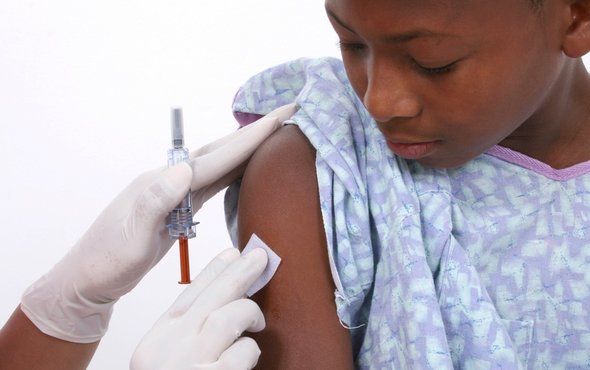(单词翻译:单击)
听力文本
This is Scientific American — 60-Second Science. I'm Karen Hopkin.
Getting a vaccine can be a painful experience, especially when you're a kid. But getting told the shot might "hurt a bit" could actually make it worse.
"We know that expectation affects pain experience in adults. But we don't really know whether this is also true for children."
Kalina Michalska, a developmental neuroscientist at the University of California, Riverside. She led a study to find out.
The study included 25 adults and 48 children. And 27 of the kids had a pre-existing anxiety disorder. Because medical procedures make pretty much all kids anxious...and those who are anxious to start with tend to find the experience even more painful.
The researchers used a handheld wand to apply heat to the forearm of each participant. And they asked subjects to rate the temperature in terms of discomfort. The hottest setting was about the temperature of very warm tap water—uncomfortable, perhaps, but not damaging.
"But during the experiment, we were most interested in only one temperature: the one that each subject rated as medium."
That's where the "anticipation" part of the experiment comes in. Subjects were played one of two tones.
"One tone meant that low heat was coming; the other meant that high heat was upcoming."

But here's the sneaky part. No matter what tone was played, participants got the same heat applied—the one rated as "medium."
"So even though the subject heard a cue indicating high pain or low pain, the pain was only medium."
Or at least that's how it should have felt. But what happened was that subjects reported feeling what they thought they would.
"If we tell them through this tone that they're going to experience a lot of pain, they'll actually experience more pain: they rated the pain as higher. And conversely, if we tell them that they will experience only low pain, they also rate their experiences as less painful."
"This is really important because it kind of reinforces the necessity of not hyping up painful experiences. And also discouraging children from ramping up the experience in their head."
And the same, it seems, goes for the grownups.
"One aspect surprised us, was that all three groups experienced a similar relationship between pain expectation and pain experience. We expected the strongest correlation among anxious children. But however all three groups showed a very large effect of expectancy on their experience of pain."
The research is in the journal Psychosomatic Medicine.
Next up, Michalska says she'd like to examine whether negative associations can be unlearned. So next time you need a shot, remember: if you think it won't be so bad, maybe it won't be.
Thanks for listening for Scientific American — 60-Second Science. I'm Karen Hopkin.
参考译文
这里是科学美国人——60秒科学。我是凯伦·霍普金。
接种疫苗可能是种痛苦的经历,尤其是当你还是孩子的时候。但是,被告知打针时或许“有点儿疼”可能会让情况变得更糟。
“我们知道,预期会影响成年人的疼痛体验。但我们不清楚这是否也适用于儿童。”
加州大学河滨分校的发展神经学家卡琳娜·米哈尔斯卡说到。她领导的一项研究希望找出答案。
这项研究的参与者包括25名成人和48名儿童。其中27名儿童患有焦虑症。因为医疗程序几乎会让所有孩子产生焦虑,而那些本就患有焦虑症的孩子倾向于认为这一过程更加痛苦。
研究人员用便携式探测棒给每位参与者的小臂加热。他们让实验对象依据不舒适的程度来评价温度。最热温度相当于很温热的自来水的温度,对于这一温度参与者的评价是“或许令人不适,但不会造成伤害。”
但在实验过程中,我们最感兴趣的只有一种温度:即每名实验对象评价为“中等”的温度。
这就是实验“预期”要开始发挥作用的部分了。实验对象会听到两种不同的提示音。
“一种提示音说热度会降低;另一种提示音说热度会上升。”
但这个部分很狡猾。无论播放哪种提示音,参与者被施加的热度是一样的,都是被评为“中等”的热度。
“因此,即使实验对象听到了表明剧烈疼痛或轻微疼痛的提示,实际的疼痛只是中等程度。”
或者至少可以说,这是疼痛本应被感觉到的程度。但实际上,实验对象报告的疼痛感受是他们以为他们会感觉到的。
“如果我们通过提示音告诉参与者,他们将体验到很多疼痛,他们实际上会体验到更多疼痛:他们将疼痛程度标得很高。相反,如果我们告诉他们,他们只会体验到很小的疼痛,那他们也会将疼痛级别标得低一些。”
“这点非常重要,因为它加强了不夸大疼痛体验的必要性。同时也阻止儿童在脑中增强疼痛经历。”
看起来这同样适用于成年人。
“让我们惊讶的是,就疼痛预期和疼痛体验来说,所有三个实验组都经历了相似的联系。我们此前认为焦虑症儿童之间的关联性最强。但是,所有三组的实验都表明,预期对他们的疼痛体验产生了极大的影响。”
这项研究结果发表在《心身医学》期刊上。
米哈尔斯卡表示,接下来她想研究一下人们是否会在未经学习的情况下就懂得“消极联想”。因此,下次再打针时要记住:如果你认为没那么疼,也许就真的没多疼。
谢谢大家收听科学美国人——60秒科学。我是凯伦·霍普金。
译文为可可英语翻译,未经授权请勿转载!
重点讲解
重点讲解:
1. tend to do sth. 往往会;经常就;
Women tend to live longer than men.
女人往往比男人长寿。
2. come in (在某件事中)起作用,发挥作用;
I understand the plan perfectly, but I can't see where I come in.
我完全了解这项计划,可是不明白我能起什么作用。
3. hype up 煽动;使兴奋;
In advertising, the term is often used as a hyperbole, a superlative to hype up a product.
在广告上,这种措词常用作夸张词,一种大肆宣传一个产品的最高级词。
4. go for 适用于;
It is illegal to dishonour bookings; that goes for restaurants as well as customers.
不履行预订是违法行为,这既适用于餐馆和也适用于顾客。


